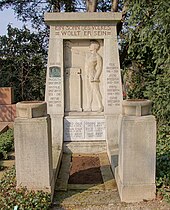August Dreesbach
August Dreesbach (born August 13, 1844 in Düsseldorf , † November 25, 1906 in Berlin ) was a German politician.
life and work
The trained carpenter Dreesbach became a member of the General German Workers' Association (ADAV) in Düsseldorf . In 1874 he was sent to south-west Germany as a full-time agitator , first to Stuttgart and after a short time to Mannheim . From 1875 he was Mannheim chairman of the SAPD and in 1877 he became editor of the newly founded party newspaper Pfälzisch-Badisches Volksblatt , which was banned the following year due to the Socialist Law .
In 1884 he was the first social democrat - together with Franz Königshausen - to be elected to the Mannheim city council. In the 1890 Reichstag election , Dreesbach won the runoff election against Philipp Diffené and he was Baden's first SPD member to become a member of the German Reichstag . In the same year he became director of the newly founded SPD newspaper Volksstimme . In 1891, Dreesbach and Philipp August Rüdt were the first two Social Democrats - both from the Mannheim constituency - to be elected as members of the Second Chamber of the Baden State Parliament. In the Reichstag election in 1893, Dreesbach was defeated by Ernst Bassermann , but in 1898 he again made it into the Reichstag. In 1903 he resigned his mandate in the state parliament in order to concentrate fully on the Reichstag.
In 1906 Dreesbach, who was married to Natalie Müller (1855–1942), died in Berlin. 30,000 people attended his funeral service in Mannheim. The city later named a street in the Neckarau district after him.
The tomb in the main cemetery in Mannheim has the shape of an Egyptian temple gate made of shell limestone. One recognizes a naked male figure striding to the left, holding a hammer in his left hand and a burning torch in his right. Before him is an altar or anvil. In the lintel is the inscription “He wants to be a son of the people” and in the left door pillar is a bronze relief with a portrait of Dreesbach.
In 2006 the August Dreesbach Verlag was founded in Munich , which was named after the social democrat, inspired by the “straightforwardness and standing up for one's own views”.
literature
- Baden biographies, VI. Part. 1902–1911, edited by Albert Krieger, University bookstore Carl Winter, Heidelberg 1927, p. 277 ff.
- Jörg Schadt , Wolfgang Schmierer (Ed.): The SPD in Baden-Württemberg and its history . Stuttgart 1979, ISBN 3-17-004683-7
- City of Mannheim, Michael Caroli, Ulrich Nieß (ed.): History of the city of Mannheim. Volume 2: 1801-1914 . Ubstadt-Weiher 2007, ISBN 978-3-89735-471-5
Individual evidence
- ↑ For the individual elections see Carl-Wilhelm Reibel: Handbook of the Reichstag elections 1890–1918. Alliances, results, candidates (= handbooks on the history of parliamentarism and political parties. Volume 15). Half volume 2, Droste, Düsseldorf 2007, ISBN 978-3-7700-5284-4 , pp. 1299-1303.
- ↑ MARCHIVUM: street names, Drees Bach street. Retrieved August 27, 2018 .
- ^ Wolfgang Münkel: Cemeteries in Mannheim. Guide to the graves of well-known Mannheim personalities . SVA, Mannheim 1992 ISBN 3-87804-213-2 , p. 220.
- ^ August Dreesbach Verlag. (No longer available online.) Archived from the original on January 4, 2017 ; Retrieved January 3, 2017 .
Web links
- Dreesbach, August Herrmann Josef in the database of members of the Reichstag
- Biography of August Dreesbach . In: Heinrich Best : database of the members of the Reichstag of the Empire 1867/71 to 1918 (Biorab - Kaiserreich)
- Speeches by August Dreesbach in the Baden state parliament in the digital collections of the Badische Landesbibliothek
| personal data | |
|---|---|
| SURNAME | Dreesbach, August |
| ALTERNATIVE NAMES | Dreesbach, August Hermann Josef (full name) |
| BRIEF DESCRIPTION | German politician, MdR |
| DATE OF BIRTH | August 13, 1844 |
| PLACE OF BIRTH | Dusseldorf |
| DATE OF DEATH | November 25, 1906 |
| Place of death | Berlin |
